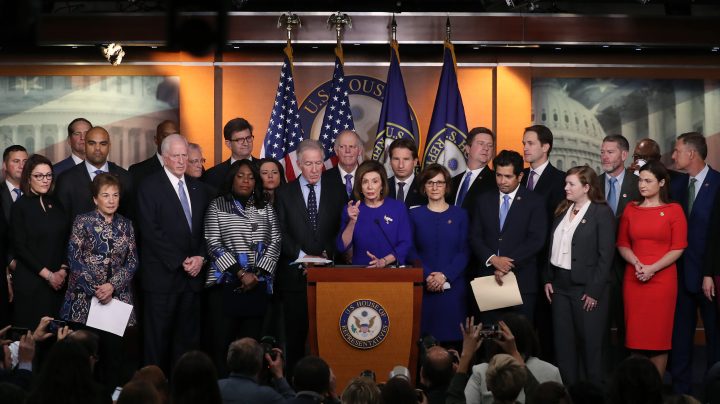
What will the new North American trade agreement change?

An agreement has been reached by House Democrats on a modified North American trade pact, more than two years after the Trump administration started the process of renegotiating NAFTA. According to Majority Leader Mitch McConnell, the Senate will vote on the deal in 2020.
The U.S.-Mexico-Canada Agreement updates the 25-year-old deal which had been criticized for allowing manufacturing jobs to move to Mexico, where labor costs are lower.
“There is no question, of course, that this trade agreement is much better than NAFTA,” House Speaker Nancy Pelosi said at an event announcing the agreement.
We took a closer look at what “better” means in the context of some of the sectors likely to be most impacted by the agreement.
Drug pricing and the pharmaceutical industry
The pharmaceutical industry wanted USMCA to include stronger protections for biologic drugs — that is, drugs made from living organisms, not chemical compounds. Initially, USMCA did contain a provision that would have protected companies making biologics from generic competition for ten years. Drug makers say they need that protection, so they can get a return on their investments in research and development.
But Democrats said that would complicate their efforts to bring down drug prices. They won this battle. The compromise reached with the Trump administration does away with the protection for biologics. And the Democrats say USMCA “will serve as the new standard for all future U.S. trade deals.”
Tech regulations and free speech
It might be easy to miss, but written into USMCA is one of the more controversial aspects of U.S. law when it comes to the internet and free speech: Section 230 of the Communications and Decency Act of 1996.
That’s a portion of the law shielding online platforms from being liable for user content. If someone posts a manifesto on Twitter before a shooting, for example, Twitter has no liability.
Last year, Washington pushed back on one front: sex trafficking. Victims of online sex trafficking can now take legal action against websites that facilitated their exploitation. While some anti-trafficking activists saw this as a victory, free speech activists say it endangers free speech online.
The language of the trade pact mirrors Section 230, meaning that tech companies will have the same legal protections in Mexico and Canada as they do here at home.
In Mexico, where digital censorship is a growing problem, activists applaud any protection of free speech on the internet. According to Vladimir Cortés of freedom of speech advocacy group Articulo 19, Mexican news sites have reported on politicians, corruption and issues affecting communities, only to be told by internet providers to take the reporting down due to alleged intellectual property violations.
“We’re seeing more cases of censorship, in which an internet provider tells a blogger to take a story down, or else access to his or her whole site will be blocked,” Cortés said. “And we have been able to trace some of the complaints that led to the removal, to the businesses that were being reported on. So, yes. We are concerned. We are staying alert on what happens next.”
The automotive industry and jobs
Although the specifics the trade deal’s provisions are yet to be revealed in full, there are two expected changes.
High-wage jobs: A significant portion of materials (40% in an earlier version of the trade deal) in North American autos must be produced by workers earning $16 an hour or more. This is designed to bring more auto jobs to high-wage countries, including the United States and Canada.
North American content: The percentage of parts required to be sourced from Mexico, Canada or the United States will increase (in an earlier version, USMCA raised this from 62.5% to 75%).
However, independent studies have suggested these rules could raise costs, and consumer prices, and thus hurt the U.S. auto industry. The U.S. International Trade Commission estimates the prior USMCA draft “will have a negative impact on consumers, since light vehicle prices are likely to increase, which would decrease consumption.”
A study by the Federal Reserve Bank of St. Louis found the trade deal “could lead to decreased global demand for cars manufactured in North America.”
There’s a lot happening in the world. Through it all, Marketplace is here for you.
You rely on Marketplace to break down the world’s events and tell you how it affects you in a fact-based, approachable way. We rely on your financial support to keep making that possible.
Your donation today powers the independent journalism that you rely on. For just $5/month, you can help sustain Marketplace so we can keep reporting on the things that matter to you.












